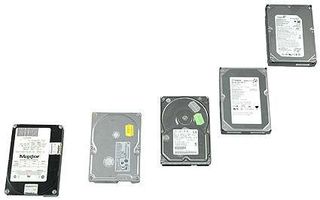15 Years Of Hard Drive History: Capacities Outran Performance
Where Has All The Power Gone?
These are exciting but also difficult times for the storage industry. The gradual transition to high definition multimedia content greatly improves our experience, but also multiplies our storage requirements. There is high demand for ever-increasing storage capacities thanks to ever-larger quantities of digital audio, photos and video. As a consequence, capacities for 3.5" hard drives have also grown, all the way up to 750 GB. Unfortunately, performance has not been able to increase at nearly the same rate.
There has been tremendous consolidation going on in the industry. Maxtor acquired Quantum only a few years ago, and that company was recently merged into the Seagate universe. Hitachi, Samsung and Western Digital are the other main players in the desktop hard drive arena.
Seagate holds the capacity crown at 750 GB per 3.5" hard drive for its Barracuda 7200.10, while Samsung has been popular for its quiet operation and great bang for the buck. Western Digital's 10,000 RPM Raptor drives have held the performance crown for years, although these drives were originally meant to be entry-level professional drives. And Samsung, finally, may have a decent advantage in the future with a possible hybrid hard drive; it is the only firm in this quartet that manufactures both magnetic and Flash storage.
All of today's 3.5" hard drives deliver maximum read transfer speeds of at least 55 MB/s, and access times of 15 ms or less. The quickest drives exceed a maximum of 70 MB/s and access data in an average of 13 ms. Western Digital's Raptor delivers over 85 MB/s at a quick 8 ms access time, ideal for those who want increased performance for applications or just faster Windows booting, but this comes at the cost of a higher price and less overall capacity than slower drives. If you are interested in the performance of current and prior-generation hard drives, please check out our hard drive performance charts.

Of course, the question is: what do all of these numbers mean? How do these performance numbers compare to those of other components inside a PC? How does the performance of today's drives compare to that of older drives? Will a current hard drive always be superior to an older one?
We looked for older hard drives in our test lab, searching some boxes with really ancient hardware. And we did find some pretty old drives. The first interesting finding was that they all still worked properly, despite being designed in an era that was dominated by MS DOS 5.0 and Windows 3.1.
Join our discussion on this topic
Stay on the Cutting Edge
Join the experts who read Tom's Hardware for the inside track on enthusiast PC tech news — and have for over 25 years. We'll send breaking news and in-depth reviews of CPUs, GPUs, AI, maker hardware and more straight to your inbox.
Current page: Where Has All The Power Gone?
Next Page Hard Drives: 40 MB To 750 GB - 3,500 To 10,000 RPM-
There is a typo in the article:Reply
Quantum's Fireball was available about five years after the 40 GB Maxtor drive discussed above,
It should be 40MB, obviously -
badcat "And Samsung, finally, may have a decent advantage in the future with a possible hybrid hard drive; it is the only firm in this quartet that manufactures both magnetic and Flash storage." WRONG! This technology existed in enterprise level hard disks for some time now.Reply
Most Popular

